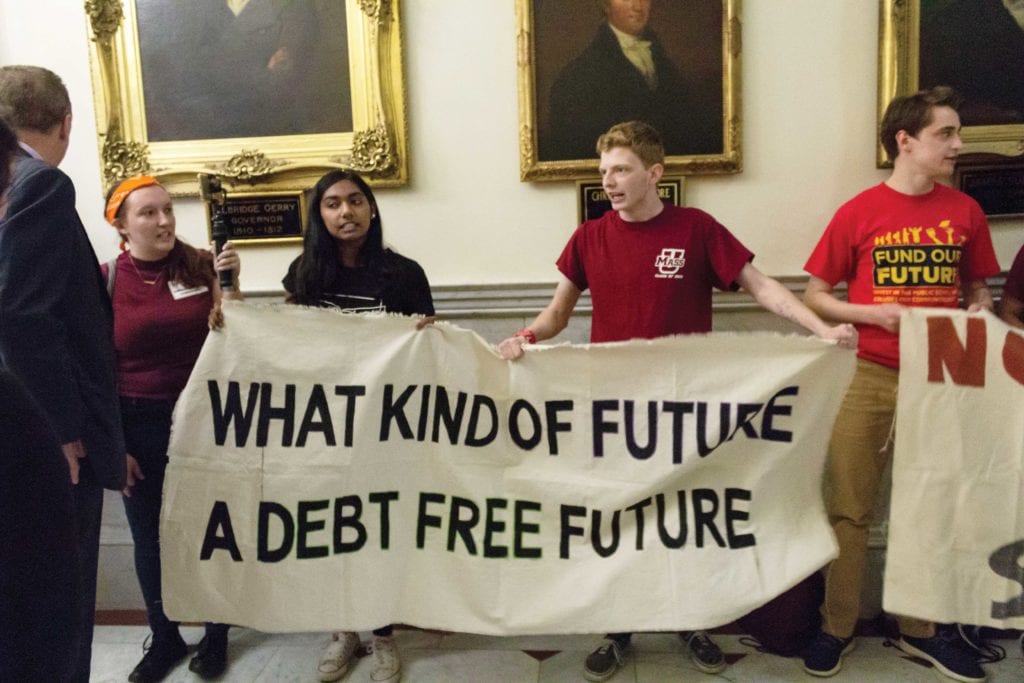
College student activists ended a five-day sit-in at the Massachusetts State House last week after they failed to secure a meeting with legislative leadership to talk about the rising cost of higher education in the state.
The students, who are part of the Public Higher Education Network of Massachusetts (PHENOM), including many who attend University of Massachusetts Amherst, had sat outside the offices of Senate President Karen Spilka and House Speaker Robert DeLeo last week, hoping to speak with them about the CHERISH Act and the Debt Free Future Act, two bills that would lower the cost of public colleges for the students who attend them.
“For five days we have requested actions regarding the CHERISH Act, the Debt Free Future Act, the simple funding of UMass budget requests, and those have been answered with disrespect and degradation,” said James Cordero, one of the participating students, as the group announced the end of their protest. “[Legislators’] mistakes of ignoring students and showing students across the Commonwealth that they will never be prioritized on this Hill — those mistakes they will reckon with for months, if not years, to come.”
The CHERISH Act, filed by Sen. Jo Comerford in the Senate and Reps. Sean Garballey and Paul Mark in the House, would freeze tuition and fees at public universities for five years and provide more state funding for public higher education in Massachusetts.
Funding for public higher education has been cut by approximately 31 percent since fiscal year 2001. The CHERISH Act would provide an additional $500 million in state funding for UMass, the state university system and community colleges, and bring the per-student funding level back to 2001 levels over a five-year schedule.
The Debt Free Future Act, filed by Sen. Jamie Eldridge and Rep. Natalie Higgins, guarantees free public higher education for Massachusetts residents.
While both bills have gained wide support on Beacon Hill (the Debt Free Future Act has almost 70 co-sponsors, while the CHERISH Act has approximately 120), neither Spilka nor DeLeo has come out in support of the bills.
“Both the House and the Senate have passed budgets that mean more students are going to go hungry, more students are going to be homeless, tuition and fees are going to go up, and families aren’t going to have access to public higher education,” said Zac Bears, executive director of PHENOM. “In a state like Massachusetts, where you’re going to need some sort of certification to get a job, the fact that we have the fastest-growing public college costs in the country and the second-fastest growing student debt burden in the country — we’re in some serious trouble.”
The day before they ended the sit-in, students were threatened with arrest for trying to move the sit-in into DeLeo’s office, Bears said.
DeLeo disputed this in a statement, saying that the members of PHENOM were engaging in “Trumpian tactics.”
“I value participation by all stakeholders and everyone is entitled to their opinion on how taxpayer funds should be appropriated. Everyone, however, is not entitled to their own facts,” DeLeo said. “Whether they’re alleging they were threatened with arrest, ignored or that the State House uses facial recognition technology, these students have opted to present their own, wildly inaccurate facts.”
The mention of facial recognition technology refers to a Twitter post by Bears stating that he was told by a State House court officer that the building employs the technology on surveillance footage.
The contentiousness of the protest continued into its final day, as the students’ chanting disrupted a military memorial event elsewhere in the State House, angering attendees of that event and prompting State House court officers to confront the protesters.
Bears said that the group had been unaware of the other event going on, and that the confrontation was not a factor in the ending of the protest, a decision which had already been made. He also noted that an unnamed military member who had been attending the other event sought out the students to express her support for what they were doing.
Despite the abrupt ending to the week-long sit-in, the students said they would continue the campaign through whatever means necessary to achieve their goals, including continued pressuring of legislators and a possible ballot initiative.
“The Massachusetts legislature is directly responsible for underfunding public colleges and universities since 2001,” said Irina Costache, another UMass Amherst student. “It’s unacceptable that in our society so many students have to worry where their next meal is going to come from or where they’re going to sleep at night. Education is important; it’s a right. This is not the end of the road for us.”






